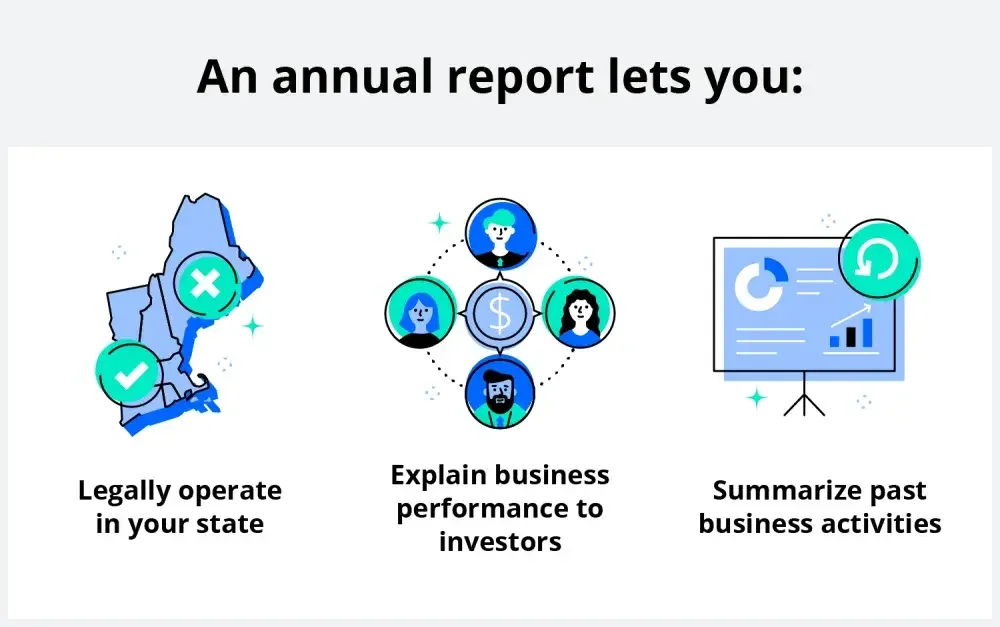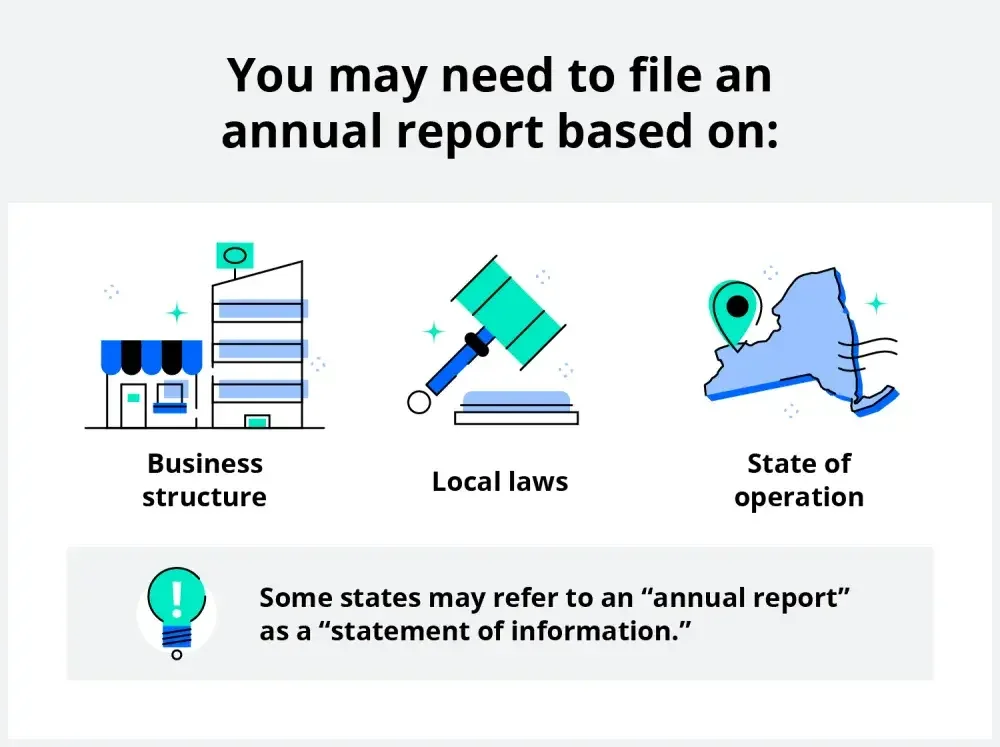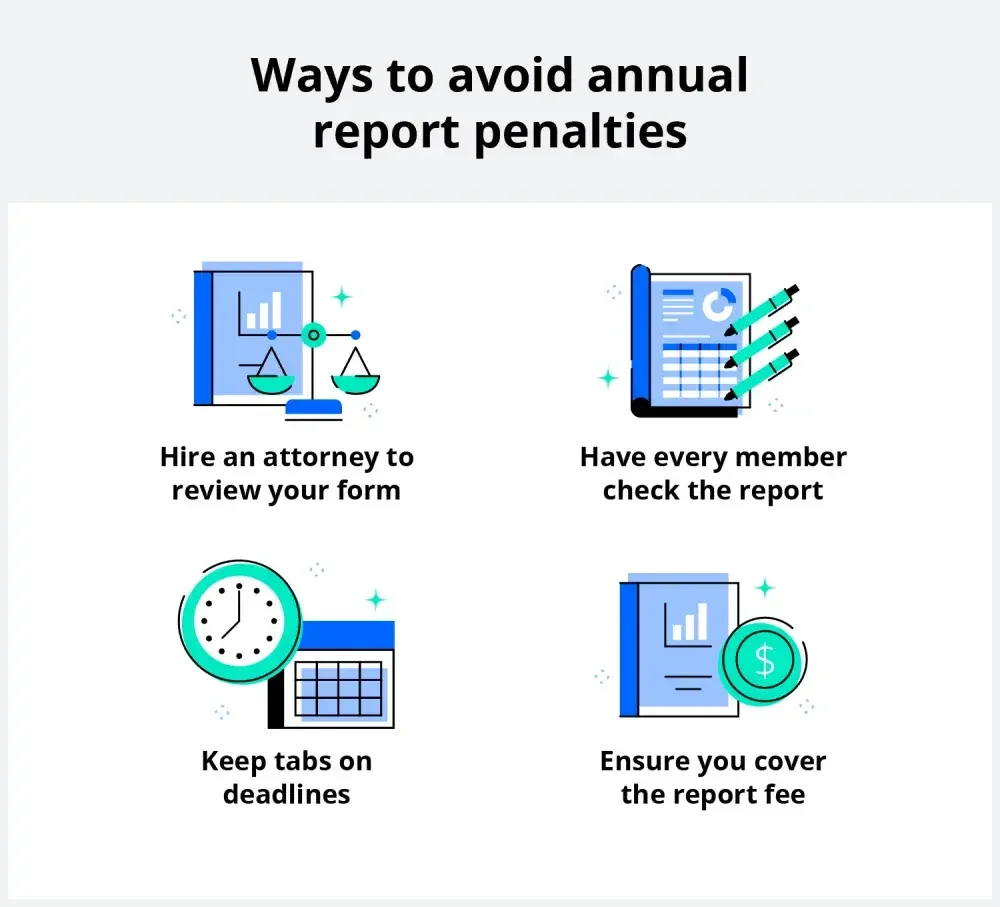Limited liability companies give business owners the legitimacy and limited liability protection they need to operate, and owners must comply with state law to enjoy these benefits. While state policies vary, almost all LLCs have to file an LLC annual report with their state of operation.
Annual reports are short documents that provide updated information about your business, including the name and address of the LLC, the people who run it, and its registered agent. By keeping this information up to date and learning how to file an LLC annual report, you can stay compliant and ensure your business runs smoothly.

What is an annual report for an LLC?
Annual reports for LLCs are required in many states to remain in good standing and legally operate. They list an LLC's basic legal information, members, and activities from the previous year. While they don't contain comprehensive financial information, they help measure a company's performance.
Note: Some states do not call their documents annual reports. Instead, they use another name, like a statement of information. In cases where reports come due once every other year or once every 10 years, companies file biennial reports (due every other year) or decennial reports (due every 10 years).
What is the purpose of an annual report?
Annual reports provide data on business operations for investors and outside analysts. In addition, companies send them to their state to operate there legally.

What information goes in an annual report?
Most annual reporting covers financial data, recent activity, and owner activity. States requiring that businesses file an LLC annual report may ask for additional information, such as the names and addresses of managers. Depending on your state, you may need to include:
- Your company's legal name
- The fictitious name your business uses (also called a DBA)
- The principal office address in the state
- The registered office address
- The names and business addresses of managers and shareholders/members of the company
- All important identification numbers for your company, such as your state entity number and EIN
- The purpose of your business
- A list of authorized signatories
- Your registered agent's name and information
Who needs to file an annual report for LLC compliance?
If your company exists as a separate legal entity, you must file annually. The following entities must file to stay in good legal standing:
- Active LLCs. Any LLC that is registered and operating in a state must file an annual report, even if no changes have been made to the business information.
- Foreign LLCs. If an LLC is registered as a foreign LLC (meaning the business operates in a state other than where it was originally formed), it must file an annual report in the state where it was formed and any other state in which it operates.
- Corporations and other registered business entities. Many states also require corporations, partnerships, and other registered business entities to file annual reports.
- Nonprofits. Some states require that registered not-for-profit business entities file an annual report with the state to stay in good standing.
Tip: To find out whether your state requires an annual filing for your type of business entity, visit the state's website where you filed your organizational documents or consult a business compliance specialist.

How to file an annual report for an LLC
To file an annual report, you'll need to learn about your state's requirements. Even if it sounds daunting, most states streamline the process. If you don't want to handle the process yourself, you can hire an annual report service like LegalZoom to do it for you.
The filing process generally looks like this:
1. Learn the basics—and your state's requirements
Each state creates its own LLC annual report standards and practices. Depending on where you operate, specific report requirements may change, such as:
- The due dates (some states require annual reports, while others require a report every two or ten years.)
- Any filing fees
- The required information about your business
Check out your state's business filing website for more information about your LLC renewal requirements. It will explain when reports are due, how much it costs to file, and how you can submit them.
2. Complete the annual business report forms
After learning the annual report requirements, business owners must complete a form. They can do this in a few easy steps:
- Obtain annual report forms. Some states mail forms to a company or their registered agent. In other cases, businesses must download the form online or request it from a state agency.
- Provide all the information your state requires. While some states only need a list of member names, business addresses, and the registered agent's details, others want more information from companies. Consult your registered agent or an attorney to stay on top of requirements.
- Have all LLC members sign off on the form. For a single-member LLC, only the sole proprietor needs to sign off. For multimember LLCs, all owners must certify the document.
To ensure the information on your filing is accurate, you can include or cross-reference other documents:
- Financial information: Documents including balance sheets, cash flow reports, and financial projections
- Documents on risks: Forms that lay out financial risks to your LLC and how you'll avoid them
- Executive summary: A document outlining all key financial information and legal information about a business
3. File your report in your required state
Once you've completed the form, you must submit it to the state along with any required filing fee.
Submission options vary by state, but most states:
- Allow you to fill out and send your annual business report electronically through the filing agency website
- Require you to print the form from a state agency's website and mail it to its office.
- Send the forms to an LLC's registered agent. After completing the forms, the agent will send them back to the state.
To maintain your business' registration and good standing in more than one state, you may have to file an LLC annual report form in each state in which you operate. To do this, you'll need to repeat the same procedure you used to file in your home state. Check with the Secretary of State's office in your state for details.
4. Prepare for your next annual report deadline
Some states charge hefty fees to businesses that miss the filing deadline or complete using outdated or incorrect information. Additionally, failing to file a report can jeopardize your good standing with the state, causing an interruption in operations.
Keeping up with your business' financial and legal requirements is much easier if you set yourself up for success year-round.
- Set up a reminder system for upcoming due dates on your calendar or another tool
- Keep an eye out for any policy changes in order to file annual reports to stay compliant and avoid mistakes
Annual report best practices
Help make your annual report filing process smoother by following these tips:
- Prepare for associated fees and extra costs
- Factor in franchise taxes
- Amend your report if you find errors
Prepare for fees and extra costs
While some states provide a free filing process, that isn't universal. Many states charge a fee ranging from $10 to $300 for filing your annual report and keeping your business in good standing.
Factor in franchise taxes
Franchise taxes are a bit of a misnomer—they aren’t taxes paid by franchise businesses. Franchise taxes are a fee that states impose on companies for the privilege of operating within their borders.
For example, California requires LLCs to pay a flat fee of $800 per year in franchise taxes. Other states charge a percentage fee based on the businesses income, assets, or outstanding shares of corporate stock. Some states require you to pay franchise taxes or other business taxes when you send your report.
Amend your report if you find errors
After submitting your report, you may need to make an important change. If your LLC changes its business information or you make a mistake on the report, you need to amend it.
To turn in an amended annual report:
- Use careful analysis to review your original form and determine the necessary changes. Did you misrepresent a figure, change managing principals, or move to a new location?
- Access the report through the Secretary of State where you operate. Check to see if you need an amended report form or can reuse the original. If you have to reuse the original, write “amended" up top for reference.
- Get signatures from all members certifying the form is correct.
- Pay the annual reporting fee. Some states make exceptions for amendments or charge less.
Avoid annual report penalties and fines
Failing to submit your annual report or filing one with errors can lead to fines and penalties resulting from falling out of compliance. It can also result in the dissolution of your LLC or business. You may owe additional fees to reinstate your business, on top of any fines for not filing the annual report. Not being in compliance with state requirements can complicate insurance and loans.
The most common annual renewal mistakes include:
- Incomplete report submissions
- Incorrect payment methods or fee amounts
- Execution errors, such as failing to sign or date the paperwork or having an unauthorized person sign
- Failing to send your annual report or filing late
You can avoid penalties by staying on task and handling your annual business report well before it's due. All LLC members should check the report for mistakes before submitting it. You can have an attorney review the form to be confident that you're in compliance.

Annual report considerations by state
Every state has annual report requirements for compliance. Some states require them for all types of business entities, and others don't require annual reports at all. Some require reports for certain types of business entities but not others.
Certain states impose particular guidelines that businesses need to keep in mind. We'll break down some state-specific processes below:
Do I have to file an annual report for LLCs in New Jersey?
Unlike other states, New Jersey requires that all businesses complete an annual report to remain in compliance. This report focuses on your registered agent and address, ensuring both are up to date. The state also requires a $75 filing fee with each submission. Businesses must turn in their report by the last day of the month they completed their business formation.
Businesses that don't file for two years in a row may have their charter voided. The state may also revoke its ability to do business in New Jersey.
How do I file an annual report for an LLC in North Dakota?
North Dakota policy requires that business owners submit their LLC annual reports by mail or the FirstStop service. FirstStop is a software platform that handles business and licensing tasks for the Secretary of State. Companies can complete the process online with a credit card payment or mail their report with a check or money order payable to the Secretary of State.
The state requires businesses to submit their report and a $50 fee by Nov. 15. If a business files after that date, the cost jumps to $100.
Do I have to file an annual report for my LLC in Mississippi?
All limited liability companies operating in Mississippi must complete an annual report with the secretary of state. Businesses can file any time between Jan. 1 and April 15. Unlike other states, Mississippi requires that owners file online. Domestic LLCs file for free, but corporations must pay $25.
How do I file an annual report for an LLC in Wisconsin?
Wisconsin sends an LLC's registered agent annual report forms before the deadline. From there, a business can send its report by mail or online through the Department of Financial Institutions (DFI). Foreign LLCs need to send in their reports via mail.
Domestic LLCs pay a filing fee of $25, while foreign LLCs pay $80. In addition to the fee, if you pay online, you’ll be charged a $1 processing fee.
Do I have to file an annual report for my LLC in Florida?
In Florida, LLCs, corporations, limited partnerships, and limited liability limited partnerships must submit their reports by May 1. The annual report fee in Florida ranges from $61.25 to $500, with LLCs being charged $138.75.
The state levies a $400 late fee for businesses that don't file in time. Florida will dissolve companies that fall out of compliance by ignoring or failing to pay the fee by the third Friday in September.
Florida businesses must complete the filing through the SunBiz website. Companies operating in Florida receive a 12-digit document number after starting an LLC in Florida. Businesses complete their report using this number as their ID in the SubBiz database. LLCs will receive this number after registering their business in Florida.
FAQs
How often are annual reports due?
Contrary to their name, not all states require annual reports once a year. Some states require that you turn in a report yearly, while others have a biennial or even decennial timeline.
The report may be due on the anniversary of your business' formation, or your state may have a single due date for everyone. Other states require you to send an initial report within a specific period after your business' formation. Research your state's guidelines for your business type to learn how often you must provide a report so you do so on time.
How much does it cost to file an annual report?
The cost to file your annual report will depend upon which state you're filing in and what type of business entity you have. An LLC may pay a different fee than a corporation.
The filing fee in some states is free, while other states may charge a filing fee for annual reports that’s $300 to $500. The fee from state to state can vary significantly.
In addition to the fee to file your annual report, some states also charge a franchise tax. This may be a flat fee or might be based on your company’s revenue or assets.
Can I file my LLC annual report online?
In some states, yes. In other states, you’ll be required to submit your business filings through the mail.
Do all states require an LLC to file an annual report?
No, whether or not you are required to file an annual report depends upon the state. States such as Arizona, New Mexico, and Ohio do not require LLCs to file annual reports.
Jenn Morson contributed to this article.

